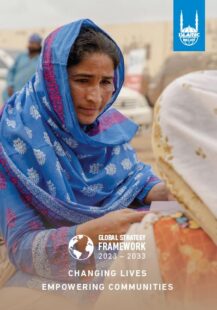Since Islamic Relief Worldwide was established in 1984, our goal has been to alleviate poverty and suffering for the most disadvantaged families and communities.
For nearly 40 years, we have worked shoulder to shoulder with others also striving for a fairer, safer world for everyone.
Islamic Relief is proud to have contributed to some extraordinary human development successes:
- More than a billion people have been lifted out of poverty
- Life expectancy has risen across the planet
- Diseases that used to kill millions of people are now treatable
- Access to education has been greatly expanded, particularly for women and girls.
Yet in recent years, humanitarian need has grown, rather than declined.
“The ultimate aim of every good charity is to help create a world in which it is no longer needed,” says Dr Ihab Saad, chair of the board of trustees at Islamic Relief Worldwide.
“However, despite the huge advances made, Islamic Relief has never been needed more.
“The impacts of the climate crisis have become more severe; global governance is faltering as countries increasingly compete for resources and power.
Inequality is rising due to the abuse and monopolisation of resources and the exploitation of the many by the few.”
Decades of progress is under threat.
These interconnected challenges further marginalise the poorest and most vulnerable and entrench the structural inequalities that exacerbate poverty and injustice.
Striving for deep and positive change for all
Islamic Relief’s new 10-year strategy, spanning 2023-2033, is our response to these challenges.
It sets out a path as to how Islamic Relief can fulfil our mission and deliver the most significant impact for those that we serve. Inspired by our Islamic faith and the teachings of the Qur’an, the strategy is guided by the Maqasid Framework. The Arabic word ‘Maqasid’ means goal or purpose, and denotes an Islamic legal doctrine which emphasises the sanctity of every individual’s life and dignity and their rights to security, health, a sustainable environment, food, shelter and clean water.
Following a year of consultation with the Islamic Relief global family, local partners, staff in our programme offices and supporters, we designed the strategy with a single goal: to serve the most disadvantaged families and communities – regardless of their faith, race, class, disability or gender. At its heart lies the principle that to affect systemic change, we must address the root causes of inequality and injustice.
An integrated programme approach
“We will do this through an integrated programme approach,” explains our chief executive Waseem Ahmad. “We will combine our humanitarian assistance, sponsorship of orphaned children, long-term social development programming and advocacy work to comprehensively address the needs of those we are supporting and help build their capacity and resilience to overcome poverty and vulnerability.”
Over the next 10 years, we aim to achieve 3 core outcomes:
- We will save lives and reduce vulnerability to humanitarian crises
- We will empower communities to tackle poverty and vulnerability
- We will advocate for change to the system to eliminate the global and local root causes of inequality.
Our core humanitarian and development programme areas will continue responding to humanitarian crises with life-saving assistance, tackling food security and nutrition, and building sustainable livelihoods, health and education. We will continue to work with our humanitarian partners across the world towards achieving the Sustainable Development Goals.
Aligning fundraising and advocacy to drive change
Islamic Relief wants to empower our supporters – so crucial to our ability to serve the most disadvantaged families and communities – to advocate for change. We will direct more of our focus to advocacy and campaigning in wealthier countries, to affect change in poorer countries which are bearing the brunt of the climate crisis and the erosion and abuse of the rules of a fair global economy.
By aligning our fundraising and advocacy activities, we will influence those in power to fix the global economic systems and structures that entrench poverty and inequality.
Strengthening our ability to serve
For Islamic Relief to meet the growing humanitarian needs and achieve our goals, it is vital that we grow our Islamic Relief family, building a presence in new markets and strengthening our relationships with funders and supporters.
To maintain and build trusted partnerships, we will continue the programme of governance reforms that we began in 2020. We will further increase the diversity of the Board and remove the barriers to increased impact and effectiveness, including ensuring support functions are close to our programme teams to allow us to respond even more quickly to humanitarian crises.
Our strategy is ambitious, yet achievable.
It is founded in our strengths, reach and experience. We know that we must learn as we implement and be responsive to evolving needs and external events. We will continue to embed monitoring, evaluation, accountability and learning across our programmes. To ensure we identify any necessary changes in our approach or strategic priorities, we will conduct detailed, timely reviews of the strategy.
To rise to the challenges that confront the world we all share, and deliver the changes that the poorest and most vulnerable urgently require, we must be innovative in our programming, bold in our advocacy and fearless in our commitment to those we serve. Our strategy sets out our path. Please join us on it.











